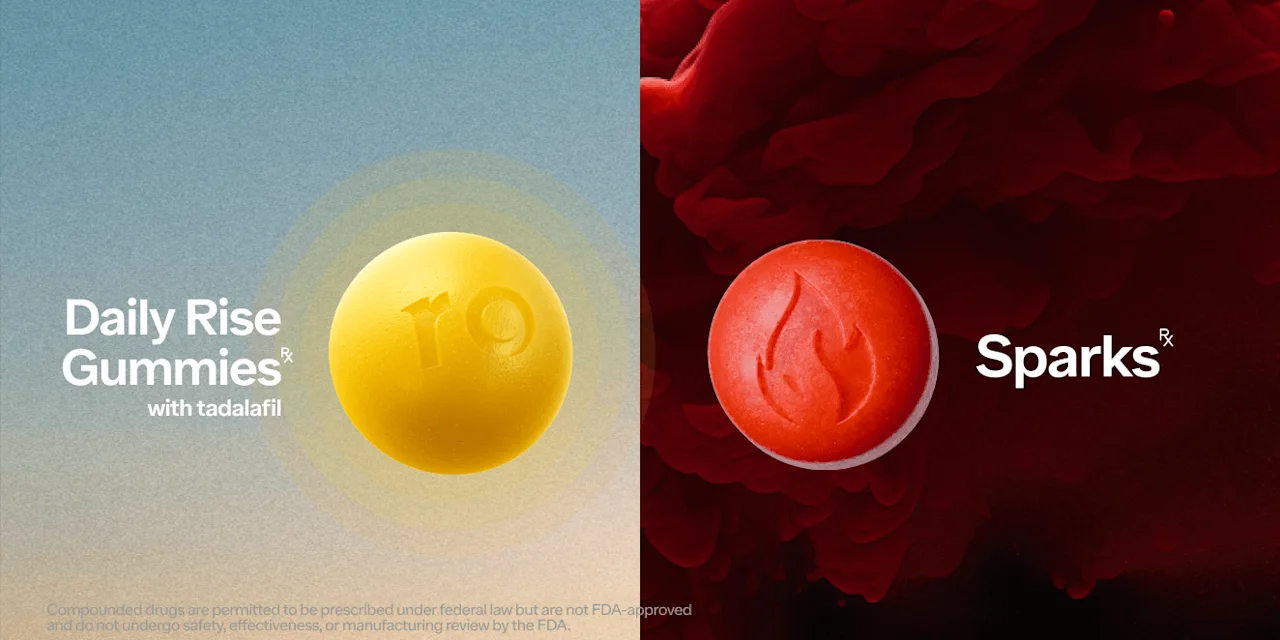Key takeaways
Cialis can last up to 36 hours, giving you more flexibility for when you have sex, while Viagra is typically taken 30 minutes to four hours before sex, making it ideal for more planned, shorter-term use.
Cialis offers two dosing options: a daily low dose that can keep you ready any time and a higher dose you can take as needed.
Both medications can be highly effective for treating erectile dysfunction, and choosing the right one depends on your lifestyle and needs.
Here's what we'll cover
Key takeaways
Cialis can last up to 36 hours, giving you more flexibility for when you have sex, while Viagra is typically taken 30 minutes to four hours before sex, making it ideal for more planned, shorter-term use.
Cialis offers two dosing options: a daily low dose that can keep you ready any time and a higher dose you can take as needed.
Both medications can be highly effective for treating erectile dysfunction, and choosing the right one depends on your lifestyle and needs.
Considering treatment options for erectile dysfunction (ED) can feel overwhelming, but knowing the basics of two popular choices—Cialis and Viagra—can make things a bit clearer and even help you feel more in control.
While both work similarly to improve sexual function, each has distinct features that may better suit different lifestyles and needs.
Cialis (tadalafil) can work for up to 36 hours (it can be taken either as needed or daily) and isn’t affected by what you eat. Viagra (sildenafil), in comparison, kicks in as soon as 30 minutes and lasts for around four hours, works faster when taken on an empty stomach, and requires you to take it before you want to have sex.
This article compares Cialis vs. Viagra and explains the differences, side effects, dosing options, and other key factors to help you decide which one may be right for you.
Cialis Important Safety Information: Read more about serious warnings and safety info.
Viagra Important Safety Information: Read more about serious warnings and safety info.
Cialis vs. Viagra: what are the biggest differences?
Both Cialis and Viagra are PDE5 inhibitors, a type of drug that blocks the enzyme PDE5 and increases blood flow to the penis to help achieve and maintain an erection. So what’s the main difference? Cialis lasts up to 36 hours and can be taken in advance, while Viagra lasts 4–5 hours and needs to be taken shortly before you get it on.
The biggest differences between these two medications include:
Duration: You can take Viagra anytime from 30 minutes to four hours before you have sex, which can be useful if you don’t want to plan too far ahead. Cialis can last up to 36 hours, giving you a longer window for erections and more freedom around timing.
Daily vs. as-needed use: Cialis offers a low-dose daily option, allowing you to get an erection any time you are sexually aroused. You can also take it as needed, about 30 minutes before sex. Viagra is taken as needed, usually about an hour before sex, and is effective for up to four hours.
Our recommendation:
Consider Cialis if you prefer a longer-lasting option that allows you to get an erection any time over a full day or more, or if you want the flexibility of a daily dose.
Consider Viagra if you want a shorter, on-demand option and don’t want to take a daily pill.
ED medications are always prescribed by a healthcare provider, and they can walk you through which medication is right for you.
| Viagra | Cialis |
|---|---|---|
What is the generic name? | Sildenafil | Tadalafil |
What does it treat? | Erectile dysfunction Pulmonary arterial hypertension (under the brand name Revatio) | Erectile dysfunction Benign prostatic hyperplasia (BPH) Pulmonary arterial hypertension (under the brand name Adcirca) |
How do you take it? | Take 30–60 minutes before sex. Effects last about 4 hours Take no more than one dose per day | Take 30–60 minutes before sex Effects last up to 36 hours Take daily at a lower dose for continuous effect |
How long does it last? | About 4 hours | Up to 36 hours |
What are the common side effects? | Headaches Facial flushing Indigestion Back pain Stuffy nose Nausea Dizziness
| Headaches Indigestion Back pain Muscle aches Stuffy nose Facial flushing Pain in arms or legs |
Is there a risk of priapism? | Yes | Yes |
Can it be taken with food? | Yes, but high-fat meals may make it take longer to work | Yes, it can be taken with or without food |
Are there potential drug interactions? | Risk of low blood pressure | Risk of low blood pressure |
What is Viagra?
Viagra is a popular medication for treating ED. It helps you get and keep an erection by increasing blood flow to the penis, and it’s taken about 30 to 60 minutes before sex. The effects of Viagra last around four hours, so it may be a better choice for planned sexual activity rather than spontaneous use.
For example, you may want to take Viagra before a big night out or a date night.
Viagra is taken only when needed and can be used once every 24 hours. This makes it a good choice for people who don’t want daily treatment or tend to have sex occasionally.
Researchers originally developed Viagra to treat angina, a type of chest pain. During testing, they found it was even more effective at helping people get erections. It became the first oral medication for ED. Approved by the FDA in 1998, Viagra is available as a brand-name pill and as a generic drug called sildenafil.
What is Cialis?
Cialis is also a medication for ED that works to increase blood flow to the penis in order to make it easier to get and keep an erection. Cialis was approved by the FDA in 2003 (It’s slightly newer than Viagra), and there are two ways to take it: Daily or as needed.
With the daily option, your healthcare provider prescribes a low dose for you to take each day, which means the medication can stay in your system around the clock. This makes it easier to get an erection any time you’re aroused, offering flexibility and spontaneity for those who tend to have sex regularly.
If you prefer not to take a pill every day, your provider can prescribe a higher dose of Cialis to take only when needed, about 30 minutes before sex.
The effects of Cialis typically last up to 36 hours, allowing for erections throughout that time without the need for additional doses. Because of its long-lasting effects, Cialis is sometimes called the “Weekend Pill.” As in, you can take the medication and then be ready for sex all weekend long. Get it?
Cialis is available as both a brand-name medication and a generic called tadalafil. Besides treating ED, it’s also prescribed for men with benign prostatic hyperplasia (BPH), aka an enlarged prostate, to ease symptoms such as trouble urinating. For BPH, you take Cialis once daily, around the same time each day.
Cialis vs. Viagra: which lasts longer?
In general, Cialis lasts longer than Viagra because Cialis stays in your bloodstream for longer. Let’s break it down for you:
How long does Cialis last: As stated before, Cialis can last up to 36 hours in your body. This doesn’t mean you’ll have an erection for 36 hours straight, but you may be able to achieve an erection during that period when sexually aroused. This longer window provides more flexibility, which is especially useful if you’re unsure when sex might happen.
How long does Viagra last: Viagra, in comparison, works for about four hours after you take it. This makes it a good option for specific, planned sex but less ideal if you’re looking for more spontaneity.
That said, it’s important to note that how long each medication lasts in your body may depend on your age, kidney or liver function and if you’re taking certain other medications. In these situations, your healthcare provider may recommend a different dosage of Cialis or Viagra to adjust for differences in how your body processes the medication.
Cialis vs. Viagra: which works faster?
Here, we have a tie. Both Cialis and Viagra start working quickly and should help you get an erection in about 30 minutes to two hours.
Viagra’s start time: For most people, Viagra begins working within 30 to 60 minutes, reaching peak blood levels within 30 minutes to two hours after taking it. In studies, half of participants experienced the maximum effect an hour after taking it.
Cialis’s start time: Cialis usually starts working in about 30 minutes and reaches peak concentration in your blood after about two hours. Unlike Viagra, Cialis’s start time isn’t affected by food, so you can take it with or without a meal without impacting its effectiveness.
To get the most out of your ED medication, there are a few things you can consider:
Time it right: Taking your medication about an hour before sex allows time for the drug to take effect so you can focus on being present in the bedroom
Observe how it affects you: Everybody is different, and how a medication affects one person may be different from how it affects another person. Track how long it takes to notice the effects of your ED medication so you can better plan when to take it in the future.
Avoid high-fat meals before you take Viagra: You can take Viagra with or without food, but a meal high in fat, such as a cheeseburger and fries, may delay its effects by about an hour, so you may want to avoid large, fatty meals if you want it to work faster. Cialis is not affected by what you eat.
Both medications require sexual arousal to work—they won’t cause an unwanted erection without it.
While Cialis’s longer duration offers flexibility, it’s also important to keep in mind that if you experience side effects, they may last longer with Cialis than with Viagra due to its extended time in your system.
This is something to discuss with your healthcare provider when deciding which medication might be best for you.
Cialis vs. Viagra: what is the usual dosage?
Next up, dosage. The dosage you’ll take for Cialis or Viagra depends on whether you’re using it daily or only when needed and what works best for your body.
Cialis dosage:
Daily use: If you’re taking Cialis every day, the usual starting dose is 2.5 mg. For some, this can go up to 5 mg, especially if you also have symptoms of an enlarged prostate (BPH).
As-needed use: For those who only take Cialis before sex, the typical starting dose is 10 mg, taken about 30 minutes beforehand. Depending on your response, your healthcare provider might recommend increasing it to 20 mg or lowering it to 5 mg.
Viagra dosage:
As-needed only: Viagra is taken only when needed, usually starting with a 50 mg dose about an hour before sex (though it can work within 30 minutes and last up to 4 hours).
If 50 mg doesn’t feel strong enough, your healthcare provider may up the dose to 100 mg, or lower it to 25 mg if you experience side effects.
Don’t take your prescribed dose more than once within a 24-hour period.
Your healthcare provider can help you determine the best dosage based on your lifestyle, any health conditions, and how your body responds.
Is 20mg Cialis equal to 100mg Viagra?
No, 20mg Cialis is not equal to 100mg Viagra. While both medications can treat ED by enhancing blood flow to the penis, they contain different active ingredients and come in different dosages: Cialis (tadalafil) is available in 2.5 mg, 5 mg, 10 mg, and 20 mg, while Viagra (sildenafil) is available in 25 mg, 50 mg, and 100 mg. Cialis 20mg can last up to 36 hours, while 100mg Viagra typically lasts 4 to 6 hours. If you took 20mg of Cialis instead of 100mg of Viagra, you might notice a longer duration of action but a slower onset. Viagra tends to work faster, usually within 30 to 60 minutes, whereas Cialis can take up to two hours. Both medications are considered similarly effective for ED.
Neither dose (100mg Viagra or 20mg Cialis) is inherently stronger or more powerful than the other—they’re just different, with each offering unique advantages in terms of duration, onset time, and patient preference. While 100 mg and 20 mg are the maximum doses of Viagra and Cialis, respectively, some people may prefer Cialis for its longer window of effectiveness or the option to take it daily (and allow for increased spontaneity)—though daily use is typically at a lower dose.
Your healthcare provider is best equipped to help you find the right drug and dosage for you and your needs.
Is Cialis safer than Viagra?
When used as described, Cialis and Viagra are both safe and effective options for treating erectile dysfunction, but as with any medication, there are some risks to keep in mind, especially if you have other health conditions.
Talk to your healthcare provider first: Before starting Cialis or Viagra, you have to consult a provider (these medications are prescription only). Discuss your medical history, including any prescription medications, over-the-counter drugs, or supplements you’re currently taking. This helps prevent potential drug interactions and ensures that the medication is safe for you.
Both Cialis and Viagra can interact with other medications, especially those used for high blood pressure and heart conditions. These drug interactions include:
Nitrates: One of the most serious interactions with both Cialis and Viagra is with nitrates, which are often prescribed for chest pain (angina) or other heart conditions.
Combining nitrates with these ED medications can cause a dangerous drop in blood pressure, which can be life-threatening. Nitrates include medications like nitroglycerin and recreational drugs like “poppers.”
Alpha-blockers: Medications called alpha-blockers, used for high blood pressure and enlarged prostate, can also interact with Cialis and Viagra by lowering blood pressure too much and causing severe dizziness.
If you’re taking alpha-blockers (such as terazosin or tamsulosin), your healthcare provider may need to adjust your ED medication, monitor your blood pressure closely, or advise against its use altogether.
CYP3A4 interactions: Certain drugs that affect the CYP3A4 enzyme can interfere with how your body processes Cialis and Viagra, potentially increasing the risk of side effects. These include antifungals like ketoconazole, some HIV medications, and antibiotics like erythromycin. If you’re taking this type of medication, your healthcare provider may limit your dosage of Cialis or Viagra to a maximum of one dose every two or three days. Be sure to follow their instructions.
Other health considerations: Sexual activity can strain your heart, and may not be safe if you have a history of heart conditions or heart disease. If you have high blood pressure, it’s generally safe to take Cialis or Viagra but your healthcare provider may suggest checking your blood pressure or adjusting your dosage if necessary. Check with your provider if you have concerns about your heart health.
Cialis vs. Viagra: which costs more?
The price of Cialis and Viagra depends on whether you go for the brand-name version, a generic alternative, or a treatment like Ro Sparks. Generics are typically much more budget-friendly than their brand-name equivalents.
For example, Ro offers generic sildenafil, the active ingredient in Viagra, starting at $4 per dose, while brand-name Viagra costs $90 per dose.
Generic tadalafil, the active ingredient in Cialis, is available as Daily Rise Gummies starting at $64 per month for your first three months, or $89 per month afterward (less than $3 per day). In comparison, brand-name Cialis can cost over $80 per pill.
Ro Sparks, which combines the active ingredients in both sildenafil and tadalafil, is priced at $12 per dose with a monthly subscription plan.
Both brand-name and generic medications use the same active ingredients, so they work the same way in your body. With Ro's subscription plans, you can get effective ED treatments at a price that fits your budget.
Cialis vs. Viagra: side effects
Cialis (tadalafil) and Viagra (sildenafil) are generally safe and well-tolerated for most people. Both medications share many similar side effects, though a few differences might influence your choice.
Here's a breakdown of the common and serious side effects associated with each.
Viagra (sildenafil) side effects:
Headaches
Facial flushing
Indigestion
Back pain
Stuffy nose
Nausea
Vision changes (e.g., mild blurring, color changes, increased light sensitivity)
Cialis (tadalafil) side effects:
Headaches
Indigestion
Stuffy nose
Facial flushing (less common than with Viagra)
Back pain
Muscle aches (unique to Cialis, often in the lower back, thighs, or glutes)
Key differences in side effects
While most side effects are mild and tend to go away on their own, the duration of these medications can influence how long you might experience them. Cialis stays in your body longer than Viagra, so side effects like headaches or muscle aches may last longer with Cialis.
Additionally, Cialis is more likely to cause back pain and muscle aches, while Viagra users may be more prone to temporary vision-related side effects, such as blurring, blue-tinted vision, or sensitivity to light. These differences may make one medication a better fit depending on your tolerance and preferences.
If you experience a serious side effect, such as priapism (a prolonged erection that lasts more than four hours) or a sudden drop in blood pressure, get immediate medical attention. Always consult your healthcare provider to discuss potential side effects and the best option for your needs.
Is Cialis better than Viagra?
There’s no one-size-fits-all treatment for ED, but recent studies comparing Cialis (tadalafil) and Viagra (sildenafil) have provided insights into their effectiveness, safety, and overall patient satisfaction.
Here’s a summary of the key findings.
Cialis as a daily treatment: A clinical trial found that daily Cialis (2.5 mg and 5 mg doses) was effective in men who only had a partial response to as-needed ED medications like Viagra.
After 12 weeks, men using daily Cialis reported significantly better scores on erectile function measures compared to those on a placebo, indicating that Cialis once daily can be a viable alternative for those who may not respond fully to on-demand treatments.
Cialis vs. Viagra – overall efficacy: A meta-analysis of 16 trials comparing Cialis and Viagra showed that both medications had similar effectiveness in treating ED.
However, men and their partners tended to prefer Cialis over Viagra due to its longer-lasting effects and improved sexual confidence because of its longer duration of action.
When it comes to treating ED, both Cialis and Viagra have been approved by the FDA, which means they’ve undergone rigorous clinical testing to confirm their safety and effectiveness. Your healthcare provider will help you to assess which treatment is better for you.
Does Cialis make you harder than Viagra?
There’s currently no research showing that Cialis will give you a “harder” erection than Viagra, or vice versa. Both Cialis and Viagra work by increasing blood flow to the penis, which helps you achieve and maintain an erection when you’re sexually aroused.
Those who don't have erectile dysfunction won't get better sexual function from drugs like Viagra, but it can help them recover faster after orgasm to have sex again sooner.
Additionally, while Cialis and Viagra help with the physical side of ED, they don’t address psychological factors like anxiety or stress, which can also impact sexual performance.
If anxiety or other psychological factors are affecting your sexual function, it may be beneficial to discuss these with your healthcare provider or consider additional support, such as counseling or therapy, alongside ED treatment.
Viagra vs. Cialis and other alternatives
When it comes to choosing an ED medication, there are several options to consider. We’ll discuss the benefits of Cialis, Viagra, vardenafil (formerly Levitra), and Stendra, along with how they work, and who might benefit most from each.
Here’s a quick guide to help you decide which medication might be best for you based on your needs.
If you want the quickest results: Stendra (avanafil) works the fastest, often within 15 minutes.
If you need a long-lasting effect: Cialis (tadalafil) lasts up to 36 hours and is a good choice if you prefer flexibility or want a daily option.
If you’re looking for a reliable option that you don’t need to take daily: Viagra (sildenafil) has been on the market for over two decades and its effects can last around 4 to 5 hours.
Viagra (sildenafil)
How to take it: Take Viagra on an empty stomach for faster results. If you need to eat, opt for a light, low-fat meal before taking it and be aware that it may take up to an hour longer to kick in. Avoid high-fat meals right before taking Viagra, as they can slow down its absorption.
Onset and duration: The medication starts working in about 30 to 60 minutes and lasts for around four hours.
Typical dosage: The common starting dose is 50 mg, which can be adjusted to 25 mg or 100 mg based on effectiveness and side effects.
Best for: Viagra is ideal for occasional use, especially for planned sexual activity.
Cialis (tadalafil)
How to take it: Cialis can be taken with or without food, and offers the flexibility of daily or as-needed dosing.
Onset and duration: Cialis starts working within 30 minutes to 2 hours, and its effects last up to 36 hours, giving it the nickname "the weekend pill."
Typical dosage: For occasional use, the starting dose is 10 mg, adjustable to 5 mg or 20 mg as needed. For daily use, 2.5 to 5 mg is common.
Best for: Cialis is best suited for those who prefer flexibility or a more spontaneous sex life, and for people who may need ED support on a regular basis. Cialis is also approved for treating symptoms of an enlarged prostate, making it a good choice for men affected by both ED and BPH.
Vardenafil (previously sold as Levitra or Staxyn)
How to take it: Vardenafil can be taken as a regular pill or a rapidly dissolving tablet, and like Viagra, it works best on an empty stomach or after consuming a light meal.
Onset and duration: The medication typically works within 15 to 60 minutes, with effects lasting 4 to 5 hours after taking it.
Typical dosage: The typical starting dosage is 10 mg, and healthcare providers can adjust this down to 2.5 mg or up to 20 mg based on the patient's effectiveness and tolerance to the medication.
Best for: Vardenafil may be well-suited for those who want a fast-acting ED medication similar to Viagra, but who may prefer an option with a faster onset of action or a dissolving tablet that can be taken without water.
Stendra (avanafil)
How to take it: Food doesn’t impact Stendra, so it can be taken with or without a meal. It’s the fastest-acting option.
Onset and duration: It starts working in as little as 15 minutes and lasts for about 4 to 6 hours.
Typical dosage: The common starting dose is 100 mg, but it can range from 50 mg to 200 mg.
Best for: Stendra is a good choice for men looking for a quick-acting medication with the flexibility to take it at any time, regardless of food consumption.
Bottom line
Cialis and Viagra are both effective treatments for ED, working by increasing blood flow to the penis to help you get and maintain an erection. Since they’re the same class of medication, they offer similar benefits and side effects, but they differ in how they’re used.
Cialis offers flexibility with both a daily low-dose option for spontaneous sex and an as-needed option that lasts up to 36 hours.
Viagra is taken only as needed, usually 30 minutes to four hours before sex, making it ideal for planned encounters.
Choosing between Cialis and Viagra comes down to your lifestyle and how often you’d like to be ready for sex. If you’re diagnosed with ED, talk to your healthcare provider about your preferences and needs to determine which option is best for you.
Frequently asked questions (FAQs)
Do you stay hard after coming on Cialis?
No, Cialis helps you get an erection when aroused, but it doesn’t keep you hard after ejaculation. You’ll need to be aroused again to achieve another erection. Seek medical attention if you have an erection that doesn’t go away.
Is there any downside to taking Cialis or Viagra?
Yes, possible downsides include side effects like headaches, facial flushing, indigestion, and nasal congestion. More serious risks, like priapism (prolonged erection) or low blood pressure, are rare but can occur. Consult your healthcare provider about potential risks based on your health and to make sure it is safe with any other medications you take.
How do the mechanisms of action compare?
All PDE5 inhibitors work in a similar way by blocking the PDE5 enzyme, increasing blood flow to the penis during sexual arousal. The main differences are in how quickly they start working and how long their effects last.
DISCLAIMER
If you have any medical questions or concerns, please talk to your healthcare provider. The articles on Health Guide are underpinned by peer-reviewed research and information drawn from medical societies and governmental agencies. However, they are not a substitute for professional medical advice, diagnosis, or treatment.
DailyMed. (2017). Viagra- sildenafil citrate tablet, film-coated. Retrieved from https://dailymed.nlm.nih.gov/dailymed/lookup.cfm?setid=a2a9f459-e692-4e85-83b0-a35fbf35e91b
DailyMed. (2021). STENDRA- avanafil tablet. Retrieved from https://dailymed.nlm.nih.gov/dailymed/drugInfo.cfm?setid=a8726f90-9329-46ca-9379-2b50c78fe0e2
DailyMed. (2022). Tadalafil tablet, coated. Retrieved from https://dailymed.nlm.nih.gov/dailymed/drugInfo.cfm?setid=abcb2cda-9b3f-45f6-ad5f-c2370b0dd114
Dhaliwal, A. & Gupta, M. (2023). PDE5 inhibitors. StatPearls. Retrieved from https://www.ncbi.nlm.nih.gov/books/NBK549843/
Eli Lilly and Company. (2023). Cialis (tadalafil) tablets, for oral use: Highlights of prescribing information. Retrieved from https://pi.lilly.com/us/cialis-pi.pdf
Fahmy, G. & Hess, J. (2024). Tadalafil. StatPearls. Retrieved from https://www.ncbi.nlm.nih.gov/books/NBK603743/
Forgue, S. T., Patterson, B. E., Bedding, A. W., et al. (2006). Tadalafil pharmacokinetics in healthy subjects. British Journal of Clinical Pharmacology, 61(3), 280–288. doi: 10.1111/j.1365-2125.2005.02553.x. Retrieved from https://pmc.ncbi.nlm.nih.gov/articles/PMC1885023/
Goldstein, I., Burnett, A. L., Rosen, R. C., et al. (2019). The Serendipitous Story of Sildenafil: An Unexpected Oral Therapy for Erectile Dysfunction. Sexual Medicine Reviews, 7(1), 115–128. doi: 10.1016/j.sxmr.2018.06.005. Retrieved from https://www.sciencedirect.com/science/article/abs/pii/S2050052118300830?via%3Dihub
Gong, B., Ma, M., Xie, W., et al. (2017). Direct comparison of tadalafil with sildenafil for the treatment of erectile dysfunction: a systematic review and meta-analysis. International Urology and Nephrology, 49(10), 1731–1740. doi: 10.1007/s11255-017-1644-5. Retrieved from https://link.springer.com/article/10.1007/s11255-017-1644-5
Huang, S. A. & Lie, J. D. (2013). Phosphodiesterase-5 (PDE5) Inhibitors In the Management of Erectile Dysfunction. P & T : A Peer-Reviewed Journal for Formulary Management, 38(7), 407–419. Retrieved from https://pmc.ncbi.nlm.nih.gov/articles/PMC3776492/
Jiang, H., Zhao, L. M., Lin, H. et al. (2018). Evaluation of the long-term safety and effectiveness of Tadalafil once daily in Chinese men with erectile dysfunction: Interim results of a multicenter, randomized, open-label trial. Asian Journal of Andrology, 20(6), 587. doi: 10.4103/aja.aja_47_18/. Retrieved from https://www.ncbi.nlm.nih.gov/pmc/articles/PMC6219303/
Kedia, G. T., Uckert, S., Assadi-Pour, F., et al. (2013). Avanafil for the treatment of erectile dysfunction: Initial data and clinical key properties. Therapeutic Advances in Urology, 5(1), 35–41. doi: 10.1177/1756287212466282. Retrieved from https://journals.sagepub.com/doi/10.1177/1756287212466282
Kim, E., Seftel, A., Goldfischer, E., et al. (2015). Comparative efficacy of tadalafil once daily in men with erectile dysfunction who demonstrated previous partial responses to as-needed sildenafil, tadalafil, or vardenafil. Current Medical Research and Opinion, 31(2), 379–389. doi: 10.1185/03007995.2014.989317. Retrieved from https://www.tandfonline.com/doi/full/10.1185/03007995.2014.989317
McMahon, C. G., Stuckey, B. G., Andersen, M., et al. (2005). Efficacy of sildenafil citrate (Viagra) in men with premature ejaculation. The Journal of Sexual Medicine, 2(3), 368–375. doi: 10.1111/j.1743-6109.2005.20351.x. Retrieved from https://academic.oup.com/jsm/article-abstract/2/3/368/6872553?redirectedFrom=fulltext
Mondaini, N., Ponchietti, R., Muir, G. H., et al. (2003). Sildenafil does not improve sexual function in men without erectile dysfunction but does reduce the postorgasmic refractory time. International Journal of Impotence Research, 15(3), 225–228. doi: 10.1038/sj.ijir.3901005. Retrieved from https://www.nature.com/articles/3901005#citeas
Padda, I. S. & Tripp, J. (2023). Phosphodiesterase inhibitors. StatPearls. Retrieved from https://www.ncbi.nlm.nih.gov/books/NBK559276/
Rajkumar, R. P. & Kumaran, A. K. (2015). Depression and anxiety in men with sexual dysfunction: a retrospective study. Comprehensive Psychiatry, 60, 114–118. doi: 10.1016/j.comppsych.2015.03.001. Retrieved from https://www.sciencedirect.com/science/article/abs/pii/S0010440X15000346?via%3Dihub
Smith, B. P. & Babos, M. (2023). Sildenafil. StatPearls. Retrieved from https://www.ncbi.nlm.nih.gov/books/NBK558978/
Tsertsvadze, A., Fink, H. A., Yazdi, F., et al. (2009). Oral phosphodiesterase-5 inhibitors and hormonal treatments for erectile dysfunction: A systematic review and meta-analysis. Annals of Internal Medicine, 151(9), 650–661. doi: 10.7326/0003-4819-151-9-200911030-00150. Retrieved from https://www.acpjournals.org/doi/10.7326/0003-4819-151-9-200911030-00150
U.S. Food and Drug Administration (FDA). (2017). Viagra (sildenafil citrate) tablets, for oral use. Retrieved from [https://www.accessdata.fda.gov/drugsatfda_docs/label/2017/020895s048lbl.pdf] (https://www.accessdata.fda.gov/drugsatfda_docs/label/2017/020895s048lbl.pdf)













